
The Holy Roman Empire, also known as the Holy Roman Empire of the German Nation after 1512, was a polity in Central and Western Europe, usually headed by the Holy Roman Emperor. It developed in the Early Middle Ages and continued over 800 years until its dissolution in 1806 during the Napoleonic Wars.

Hannibal was a Carthaginian general and statesman who commanded the forces of Carthage in their battle against the Roman Republic during the Second Punic War.

Francis I was King of France from 1515 until his death in 1547. He was the son of Charles, Count of Angoulême, and Louise of Savoy. He succeeded his first cousin once removed and father-in-law Louis XII, who died without a legitimate son.

Victor Emmanuel III, born Vittorio Emanuele Ferdinando Maria Gennaro di Savoia, was King of Italy from 29 July 1900 until his abdication on 9 May 1946. A member of the House of Savoy, he also reigned as Emperor of Ethiopia (1936–1941) and King of the Albanians (1939–1943). During his reign of nearly 46 years, which began after the assassination of his father Umberto I, the Kingdom of Italy became involved in two world wars. His reign also encompassed the birth, rise, and fall of the Fascist regime in Italy.
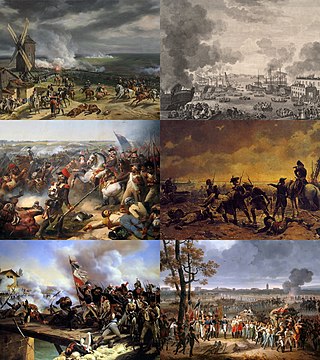
The War of the First Coalition was a set of wars that several European powers fought between 1792 and 1797 initially against the constitutional Kingdom of France and then the French Republic that succeeded it. They were only loosely allied and fought without much apparent coordination or agreement; each power had its eye on a different part of France it wanted to appropriate after a French defeat, which never occurred.
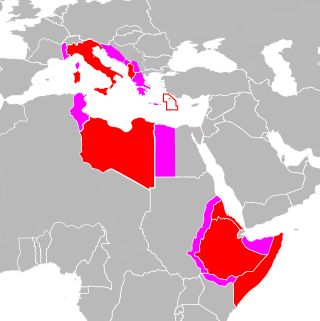
The participation of Italy in the Second World War was characterized by a complex framework of ideology, politics, and diplomacy, while its military actions were often heavily influenced by external factors. Italy joined the war as one of the Axis Powers in 1940 with a plan to concentrate Italian forces on a major offensive against the British Empire in Africa and the Middle East, known as the "parallel war", while expecting the collapse of British forces in the European theatre. The Italians bombed Mandatory Palestine, invaded Egypt and occupied British Somaliland with initial success. However, the British counterattacked, eventually necessitating German support to prevent an Italian collapse in North Africa. As the war carried on and German and Japanese actions in 1941 led to the entry of the Soviet Union and United States, respectively, into the war, the Italian plan of forcing Britain to agree to a negotiated peace settlement was foiled.

The French Revolutionary Wars were a series of sweeping military conflicts lasting from 1792 until 1802 and resulting from the French Revolution. They pitted France against Britain, Austria, Prussia, Russia, and several other monarchies. They are divided in two periods: the War of the First Coalition (1792–1797) and the War of the Second Coalition (1798–1802). Initially confined to Europe, the fighting gradually assumed a global dimension. After a decade of constant warfare and aggressive diplomacy, France had conquered territories in the Italian Peninsula, the Low Countries and the Rhineland. French success in these conflicts ensured the spread of revolutionary principles over much of Europe.
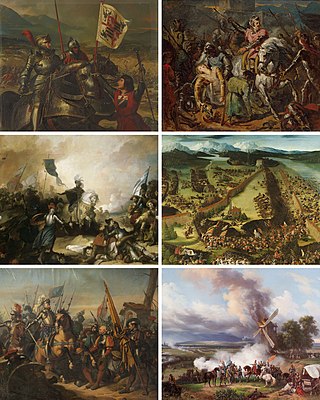
The Italian Wars, also known as the Habsburg–Valois Wars, were a series of conflicts fought between 1494 and 1559, mostly in the Italian peninsula, but later expanding into Flanders, the Rhineland and Mediterranean Sea. The primary belligerents were the Valois kings of France, and their Habsburg opponents in the Holy Roman Empire and Spain. At different points, various Italian states participated in the war, some on both sides, with limited involvement from England and the Ottoman Empire.

The Italian Social Republic, known prior to December 1943 as the National Republican State of Italy, but more popularly known as the Republic of Salò, was a Nazi-German puppet state with limited diplomatic recognition that was created during the later part of World War II, which existed from the beginning of the German occupation of Italy in September 1943 until the surrender of German troops in Italy in May 1945. The German occupation triggered widespread national resistance against it and the Italian Social Republic, leading to the Italian Civil War.
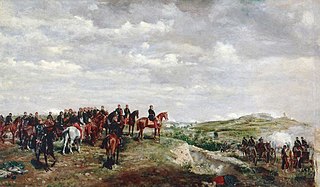
The Second Italian War of Independence, also called the Franco-Austrian War, the Sardinian War, the Austro-Sardinian War or Italian War of 1859, was fought by the Second French Empire and the Savoyard Kingdom of Sardinia against the Austrian Empire in 1859 and played a crucial part in the process of Italian Unification.

Italia, also referred to as Roman Italy, was the homeland of the ancient Romans. According to Roman mythology, Italy was the ancestral home promised by Jupiter to Aeneas of Troy and his descendants, Romulus and Remus, who were the founders of Rome. Aside from the legendary accounts, Rome was an Italic city-state that changed its form of government from Kingdom to Republic and then grew within the context of a peninsula dominated by the Gauls, Ligures, Veneti, Camunni and Histri in the North, the Etruscans, Latins, Falisci, Picentes and Umbri tribes in the Centre, and the Iapygian tribes, the Oscan tribes and Greek colonies in the South.

The Allies, formally referred to as the United Nations from 1942, were an international military coalition formed during the World War II (1939–1945) to oppose the Axis powers, led by Nazi Germany, the Empire of Japan, and the Kingdom of Italy. Its principal members by the end of 1941 were the "Big Four" - United Kingdom, United States, Soviet Union, and China.

The Battle of Bitonto was a Spanish victory over Austrian forces near Bitonto in the Kingdom of Naples in the War of Polish Succession. The battle ended organized Austrian resistance outside a small number of fortresses in the kingdom.

The Kingdom of Italy was a state that existed from 17 March 1861, when Victor Emmanuel II of Sardinia was proclaimed King of Italy, until 2 June 1946, when civil discontent led to an institutional referendum to abandon the monarchy and form the modern Italian Republic. The kingdom was established through the unification of several states over a decades-long process, called the Risorgimento. That process was influenced by the Savoy-led Kingdom of Sardinia, which can be considered Italy's legal predecessor state.
Sebastiano Visconti Prasca was an Italian general. He led the initial offensive of the Greco-Italian War, but was relieved of his command after two weeks for incompetence and substituted with General Ubaldo Soddu.

Benito Amilcare Andrea Mussolini was an Italian dictator and journalist who founded and led the National Fascist Party (PNF). He was Prime Minister of Italy from the March on Rome in 1922 until his deposition in 1943, as well as "Duce" of Italian fascism from the establishment of the Italian Fasces of Combat in 1919 until his summary execution in 1945 by Italian partisans. As dictator of Italy and principal founder of fascism, Mussolini inspired and supported the international spread of fascist movements during the inter-war period.

The history of Rome includes the history of the city of Rome as well as the civilisation of ancient Rome. Roman history has been influential on the modern world, especially in the history of the Catholic Church, and Roman law has influenced many modern legal systems. Roman history can be divided into the following periods:
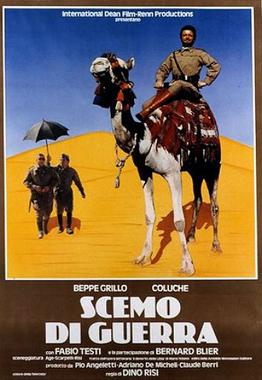
Madman at War is a 1985 Italian-French comedy film directed by Dino Risi. It was entered into the 1985 Cannes Film Festival.
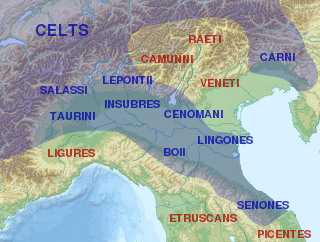
Over the course of nearly four centuries, the Roman Republic fought a series of wars against various Celtic tribes, whom they collectively described as Galli, or Gauls. Among the principal Gallic peoples described as antagonists by Greek and Roman writers were the Senones, Insubres, Boii, and Gaesatae.


















